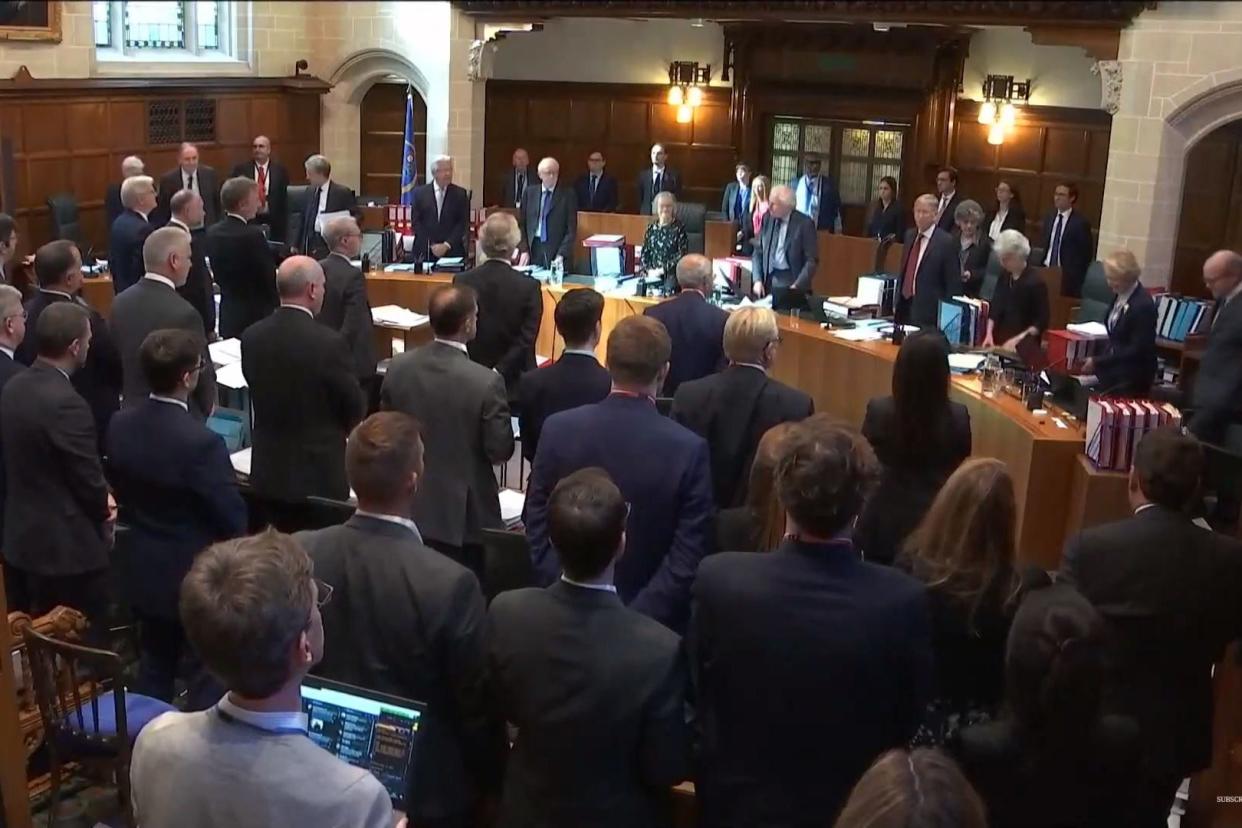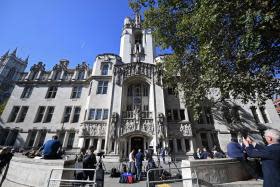Boris Johnson could refuse to recall parliament even if Supreme Court rules suspension unlawful, government lawyers say

Boris Johnson could refuse to recall parliament even if the Supreme Court rules that his decision to suspend it was unlawful, the government has said.
Speaking shortly before the 11 judges hearing the case retired to consider their verdict, government lawyers told the court that a ruling against the prime minister did not necessarily mean parliament would be allowed to resume sitting.
And even if the entire prorogation is declared void, Mr Johnson would be entitled to simply ask the Queen to suspend parliament again, they said.
The claims pave the way for a potentially explosive row next week if the court rules against Mr Johnson but the government refuses to recall parliament.
Lawyers arguing for anti-Brexit campaigner Gina Miller insisted that the suspension must be lifted “urgently” next week if the judges ruled against Mr Johnson.
They said that the speakers of the House of Commons and House of Lords could step in and reconvene parliament themselves if the government refuses to do so – a move that would trigger a full-blown constitutional crisis.
Read more
Johnson called ‘father of lies’ as Supreme Court hearing continues
The third and final day of the historic Supreme Court hearing saw Sir John Major, the Conservative former prime minister, suggest that Mr Johnson had lied about his reasons for suspending parliament.
The court also asked both sides what they thought should happen if Mr Johnson is ruled to have acted unlawfully.
The government had earlier been asked to provide a written explanation of how it planned to proceed in this scenario.
In response, it claimed that, even if the court decided that the first suspension was unlawful, the prime minister “would be entitled to reconsider the question of prorogation on a lawful basis in accordance with decision of the court”.
Depending on what the court says, "it would still either be open or not open to the prime minister to consider a further prorogation", they said.
And speaking in court for the government, Lord Keen QC argued that the suspension of parliament should not be considered unlawful even if the advice that Mr Johnson gave the Queen when requesting it was deemed to be.
This is because the process of proroguing parliament takes place in several stages. The first stage sees the prime minister ask the monarch to order the prorogation. The monarch then approves a Privy Council order announcing the dates when parliament is to be prorogued.
Government lawyers told the court that, even if Mr Johnson's advice to the Queen was declared unlawful, it did not mean that the Privy Council order that followed was. They say the order is a parliamentary matter and should therefore be seen as “forbidden territory” for the courts.
Asked whether the government was suggesting that the prorogation order would still be “legally effective” even if Mr Johnson’s advice leading to it was deemed to be unlawful, Lord Keen replied: “Yes. That is our position”.
He said it would then be for the government to decide whether or not it wanted to reconvene parliament.
In its written submission, the government also warned the judges that any attempt to recall parliament early would force ministers to move forward the Queen’s Speech currently scheduled to take place on 14 October – an outcome it said would have “very serious practical consequences”.
It said: “Extensive arrangements would have to be made, including as to security, to enable this to occur.”
But Lord Pannick QC, arguing on behalf of Ms Miller, told the court that parliament must be recalled "urgently" if the original suspension is declared unlawful.
He said: "We would expect, in the light of a declaration [that Mr Johnson had acted unlawfully], that the prime minister will ensure that parliament resumes as soon as possible next week.”
He asked the court to rule that the next step in such a situation should be for “parliament urgently to meet so that parliament can decide what happens next.”
If the government refuses, he said, then the Speaker and Lord Speaker could “take action to ensure that parliament reopens as soon as possible next week”.
Raising the prospect of another major legal battle, one of the Supreme Court judges, Lady Arden, suggested that the court could issue a further order if the government does not comply with its initial ruling. The judges could “defer that question to see what happened”, she said.
Concluding his argument, Lord Pannick said the government had given "no coherent answer" to the question of why a five-week prorogation was needed prior to the Queen's Speech and claimed there was "no rational reason" for such a lengthy break.
He suggested that a week-long suspension, from around 7 October, would have been more than enough to allow for the event to take place as scheduled on 14 October.
Claiming that Mr Johnson’s advice to the Queen was “improper” because it had the motive and consequence of undermining parliament’s ability to hold the government to account, Lord Pannick asked the court: “What was it appropriate to prorogue for five weeks - longer, as the court knows, than on any occasion in the past 40 years?”
http://players.brightcove.net/624246174001/default_default/index.html?videoId=6087159283001
Prime Minister’s motive for prorogation was to silence Parliament, court hears
The Court had earlier heard evidence on behalf of Sir John Major, the former prime minister.
His lawyer, Lord Garnier QC, said Sir John had made "a clear and unambiguous allegation in evidence...that the reasons [for prorogation] set out in the documents put before the court by the prime minister cannot be true". He added: "Where an allegation of this kind has been made, it would be normal for there at least to be some kind of witness statement."
In a witness statement, Sir John said: "The inescapable inference to be drawn is that the prorogation is to prevent parliament from exercising its right to disagree with the government and to legislate as it sees fit."
It was, he said, "utterly unacceptable" for the government to "seek to bypass" parliament in this way.
The court would be "naive" to take Mr Johnson's claims at face value, he added.
Closing the hearing, Lady Hale, the president of the Supreme Court, said a ruling could be expected early next week.
She reiterated “that this case is not about when and on what terms the United Kingdom leaves the European Union - the result of this case will not determine that”.
She said: “We are solely concerned with the lawfulness of the prime minister’s decision to advise Her Majesty to prorogue parliament on the dates in question. As we have heard, it is now a simple question."
Read more
Read more Johnson called ‘father of lies’ as Supreme Court hearing continues

 Yahoo News
Yahoo News 

